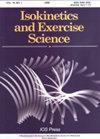Correlation of paretic knee extension strength with gait speed after stroke: A meta-analysis
IF 0.7
4区 医学
Q4 ENGINEERING, BIOMEDICAL
引用次数: 0
Abstract
BACKGROUND AND OBJECTIVE: Numerous studies have addressed the relationship between paretic knee extension strength and comfortable walking speed after stroke. However, the correlations reported are highly variable. This review sought to summarize the correlational data using meta-analysis. METHODS: Relevant literature was identified via a search of 3 bibliographic databases. Articles were screened and perused for inclusion. Included articles were examined for information on the sample studied, procedures for measuring strength and gait speed, and correlations reported between the 2 variables. Meta-analysis was used to calculate a summary correlation. RESULTS: Of 299 unique articles, 18 met inclusion criteria. Articles were diverse in regard to samples studied, procedures described, and correlations reported. Meta-analysis using data from all included studies revealed a summary correlation of 0.51. For studies using hand-held or isokinetic dynamometry, the summary correlation was 0.46 and 0.59 respectively. CONCLUSIONS: This study provides a better indication of the correlation between paretic knee extension strength and comfortable gait speed than individual studies. The correlation is high enough to provide support for the routine measurement of paretic knee extension force for individuals who have experienced a stroke.卒中后偏瘫伸膝力量与步态速度的相关性:荟萃分析
背景与目的:许多研究已经探讨了卒中后瘫痪性膝关节伸展力量与舒适步行速度之间的关系。然而,报告的相关性变化很大。这篇综述试图使用荟萃分析来总结相关数据。方法:检索3个文献数据库,检索相关文献。文章被筛选和仔细阅读以供收录。对纳入的文章进行了检查,以获取有关所研究样本的信息、测量力量和步态速度的程序,以及报告的两个变量之间的相关性。荟萃分析用于计算汇总相关性。结果:在299篇独特的文章中,有18篇符合入选标准。文章在研究的样本、描述的程序和报告的相关性方面各不相同。使用所有纳入研究的数据进行的荟萃分析显示,总体相关性为0.51。对于使用手持式或等速测功仪的研究,总相关性分别为0.46和0.59。结论:与个别研究相比,这项研究提供了更好的指标来说明瘫痪性膝关节伸展力量和舒适步态速度之间的相关性。这种相关性足够高,可以为经历过中风的患者的瘫痪性膝关节伸展力的常规测量提供支持。
本文章由计算机程序翻译,如有差异,请以英文原文为准。
求助全文
约1分钟内获得全文
求助全文
来源期刊

Isokinetics and Exercise Science
医学-工程:生物医学
CiteScore
1.20
自引率
14.30%
发文量
37
审稿时长
>12 weeks
期刊介绍:
Isokinetics and Exercise Science (IES) is an international journal devoted to the study of theoretical and applied aspects of human muscle performance. Since isokinetic dynamometry constitutes the major tool in this area, the journal takes a particular interest in exploring the considerable potential of this technology.
IES publishes studies associated with the methodology of muscle performance especially with respect to the issues of reproducibility and validity of testing, description of normal and pathological mechanical parameters which are derivable from muscle testing, applications in basic research topics such as motor learning paradigms and electromyography. The journal also publishes studies on applications in clinical settings and technical aspects of the various measurement systems employed in human muscle performance research.
The journal welcomes submissions in the form of research papers, reviews, case studies and technical reports from professionals in the fields of sports medicine, orthopaedic and neurological rehabilitation and exercise physiology.
 求助内容:
求助内容: 应助结果提醒方式:
应助结果提醒方式:


